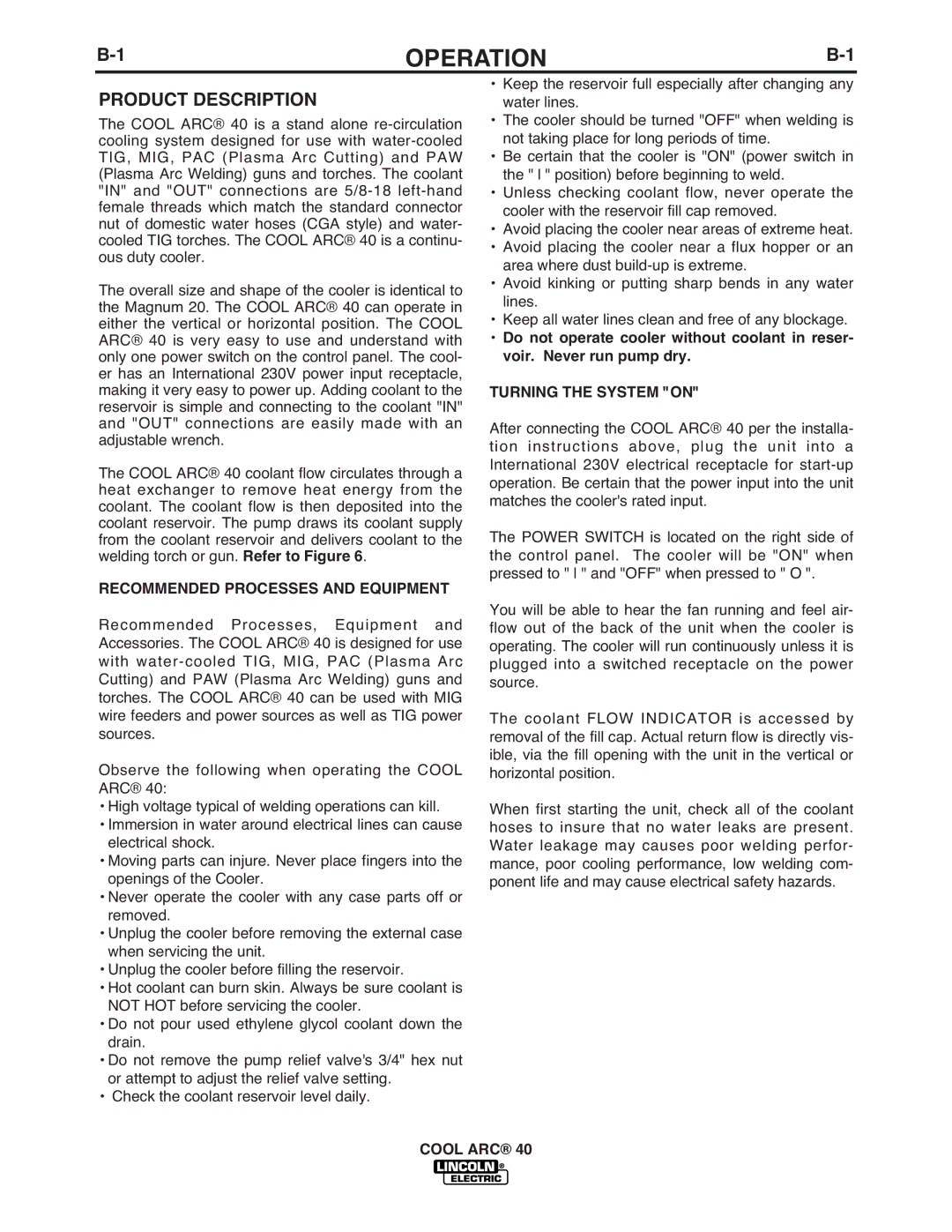OPERATION |
PRODUCT DESCRIPTION
The COOL ARC® 40 is a stand alone
The overall size and shape of the cooler is identical to the Magnum 20. The COOL ARC® 40 can operate in either the vertical or horizontal position. The COOL ARC® 40 is very easy to use and understand with only one power switch on the control panel. The cool- er has an International 230V power input receptacle, making it very easy to power up. Adding coolant to the reservoir is simple and connecting to the coolant "IN" and "OUT" connections are easily made with an adjustable wrench.
The COOL ARC® 40 coolant flow circulates through a heat exchanger to remove heat energy from the coolant. The coolant flow is then deposited into the coolant reservoir. The pump draws its coolant supply from the coolant reservoir and delivers coolant to the welding torch or gun. Refer to Figure 6.
RECOMMENDED PROCESSES AND EQUIPMENT
Recommended Processes, Equipment and Accessories. The COOL ARC® 40 is designed for use with
Observe the following when operating the COOL ARC® 40:
•High voltage typical of welding operations can kill.
•Immersion in water around electrical lines can cause electrical shock.
•Moving parts can injure. Never place fingers into the openings of the Cooler.
•Never operate the cooler with any case parts off or removed.
•Unplug the cooler before removing the external case when servicing the unit.
•Unplug the cooler before filling the reservoir.
•Hot coolant can burn skin. Always be sure coolant is NOT HOT before servicing the cooler.
•Do not pour used ethylene glycol coolant down the drain.
•Do not remove the pump relief valve's 3/4" hex nut or attempt to adjust the relief valve setting.
•Check the coolant reservoir level daily.
•Keep the reservoir full especially after changing any water lines.
•The cooler should be turned "OFF" when welding is not taking place for long periods of time.
•Be certain that the cooler is "ON" (power switch in the " l " position) before beginning to weld.
•Unless checking coolant flow, never operate the cooler with the reservoir fill cap removed.
•Avoid placing the cooler near areas of extreme heat.
•Avoid placing the cooler near a flux hopper or an area where dust
•Avoid kinking or putting sharp bends in any water lines.
•Keep all water lines clean and free of any blockage.
•Do not operate cooler without coolant in reser- voir. Never run pump dry.
TURNING THE SYSTEM "ON"
After connecting the COOL ARC® 40 per the installa- tion instructions above, plug the unit into a International 230V electrical receptacle for
The POWER SWITCH is located on the right side of the control panel. The cooler will be "ON" when pressed to " l " and "OFF" when pressed to " O ".
You will be able to hear the fan running and feel air- flow out of the back of the unit when the cooler is operating. The cooler will run continuously unless it is plugged into a switched receptacle on the power source.
The coolant FLOW INDICATOR is accessed by removal of the fill cap. Actual return flow is directly vis- ible, via the fill opening with the unit in the vertical or horizontal position.
When first starting the unit, check all of the coolant hoses to insure that no water leaks are present. Water leakage may causes poor welding perfor- mance, poor cooling performance, low welding com- ponent life and may cause electrical safety hazards.
COOL ARC® 40
